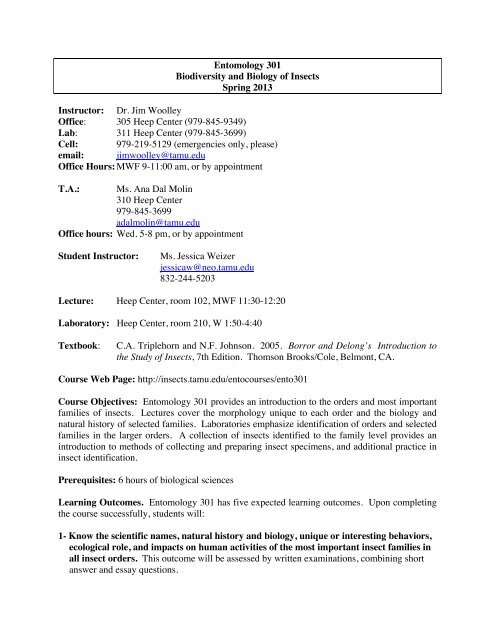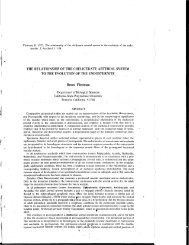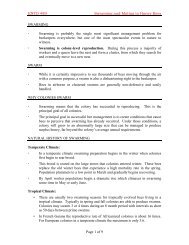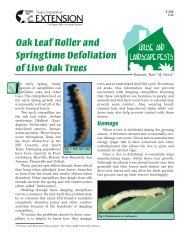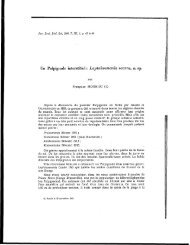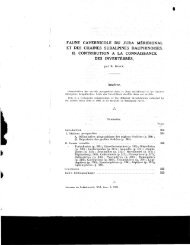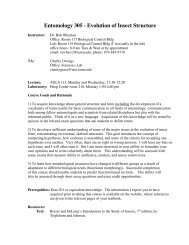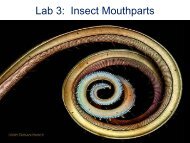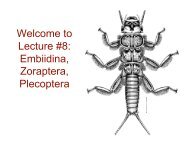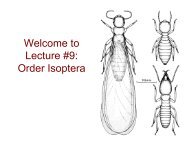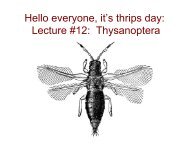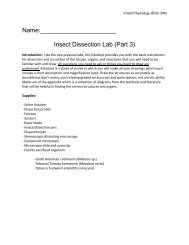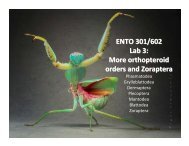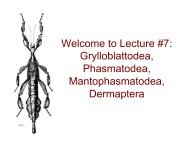Syllabus - Department of Entomology - Texas A&M University
Syllabus - Department of Entomology - Texas A&M University
Syllabus - Department of Entomology - Texas A&M University
You also want an ePaper? Increase the reach of your titles
YUMPU automatically turns print PDFs into web optimized ePapers that Google loves.
<strong>Entomology</strong> 301<br />
Biodiversity and Biology <strong>of</strong> Insects<br />
Spring 2013<br />
Instructor: Dr. Jim Woolley<br />
Office: 305 Heep Center (979-845-9349)<br />
Lab: 311 Heep Center (979-845-3699)<br />
Cell: 979-219-5129 (emergencies only, please)<br />
email: jimwoolley@tamu.edu<br />
Office Hours: MWF 9-11:00 am, or by appointment<br />
T.A.: Ms. Ana Dal Molin<br />
310 Heep Center<br />
979-845-3699<br />
adalmolin@tamu.edu<br />
Office hours: Wed. 5-8 pm, or by appointment<br />
Student Instructor: Ms. Jessica Weizer<br />
jessicaw@neo.tamu.edu<br />
832-244-5203<br />
Lecture: Heep Center, room 102, MWF 11:30-12:20<br />
Laboratory: Heep Center, room 210, W 1:50-4:40<br />
Textbook: C.A. Triplehorn and N.F. Johnson. 2005. Borror and Delong’s Introduction to<br />
the Study <strong>of</strong> Insects, 7th Edition. Thomson Brooks/Cole, Belmont, CA.<br />
Course Web Page: http://insects.tamu.edu/entocourses/ento301<br />
Course Objectives: <strong>Entomology</strong> 301 provides an introduction to the orders and most important<br />
families <strong>of</strong> insects. Lectures cover the morphology unique to each order and the biology and<br />
natural history <strong>of</strong> selected families. Laboratories emphasize identification <strong>of</strong> orders and selected<br />
families in the larger orders. A collection <strong>of</strong> insects identified to the family level provides an<br />
introduction to methods <strong>of</strong> collecting and preparing insect specimens, and additional practice in<br />
insect identification.<br />
Prerequisites: 6 hours <strong>of</strong> biological sciences<br />
Learning Outcomes. <strong>Entomology</strong> 301 has five expected learning outcomes. Upon completing<br />
the course successfully, students will:<br />
1- Know the scientific names, natural history and biology, unique or interesting behaviors,<br />
ecological role, and impacts on human activities <strong>of</strong> the most important insect families in<br />
all insect orders. This outcome will be assessed by written examinations, combining short<br />
answer and essay questions.
<strong>Entomology</strong> 301 Page 2 Spring 2013<br />
2- Be able to relate the structural differences and anatomical adaptations in the orders and<br />
important families <strong>of</strong> insects with their biology, behavior, and ecological role. This<br />
outcome will be assessed by written examinations, primarily using essay questions.<br />
3- Be able to identify on sight the orders <strong>of</strong> insects and most important families <strong>of</strong> insects.<br />
This outcome will be assessed by the “closed-book” portions <strong>of</strong> three laboratory examinations<br />
and by quizzes at the end <strong>of</strong> each laboratory period.<br />
4- Be able to use reference materials for the identification <strong>of</strong> insect families. This outcome<br />
will be assessed by “open-book” portions on laboratory examinations and by the accuracy <strong>of</strong><br />
identification in an insect collection.<br />
5- Be able to collect a wide diversity <strong>of</strong> insect groups and prepare insect specimens to<br />
pr<strong>of</strong>essional standards. This outcome will be assessed by the taxonomic diversity, quantity<br />
and quality <strong>of</strong> specimens in the insect collection.<br />
Schedule <strong>of</strong> Labs and Lectures:<br />
Monday Jan 14 Lecture 1 Introduction to course<br />
Wednesday Jan 16 Lecture 2 Introduction to Hexapoda: Protura,<br />
Collembola: Sminthuridae, Isotomidae,<br />
Hypogastruridae<br />
Wednesday Jan 16 Laboratory 1 Introduction to Lab Procedures<br />
Protura, Collembola, Diplura,<br />
Microcoryphia, Thysanura,<br />
Ephemeroptera<br />
Friday Jan. 18 Lecture 3 Diplura: Campodeidae, Japygidae,<br />
Microcoryphia: Machilidae, Thysanura:<br />
Lepismatidae<br />
Monday Jan. 21 Martin Luther<br />
King Day<br />
No classes<br />
Wednesday Jan 23 Lecture 4 Ephemeroptera: Ephemeridae, Caenidae,<br />
Heptageniidae<br />
Wednesday Jan 23 Laboratory 2 Odonata, Embiidina, Orthoptera<br />
Introduction to collecting insects<br />
Collecting kits assigned
<strong>Entomology</strong> 301 Page 3 Spring 2013<br />
Friday Jan 25 Lecture 5 Odonata: Coenagrionidae, Gomphidae,<br />
Aeshnidae, Libellulidae<br />
Monday Jan 28 Lecture 6 Orthoptera: Acrididae, Tetrigidae,<br />
Gryllidae, Gryllotalpidae, Tettigoniidae,<br />
Raphididophoridae<br />
Wednesday Jan 30 Lecture 7 Grylloblattodea, Phasmatodea,<br />
Mantophasmatodea, Dermaptera<br />
Wednesday Jan 30 Laboratory 3 Dermaptera, Plecoptera, Phasmatodea,<br />
Mantodea, Blattodea<br />
Friday Feb 1 Lecture 8 Plecoptera, Embiidina, Zoraptera<br />
Monday Feb 4 Lecture 9 Isoptera: Rhinotermitidae, Termitidae<br />
Wednesday Feb 6 First Lecture Exam (lectures 1-9)<br />
Wednesday Feb 6 Laboratory 4 Isoptera, Thysanoptera, Psocoptera,<br />
Phthiraptera<br />
Friday Feb 8 Lecture 10 Mantodea, Blattodea: Blattidae,<br />
Blatellidae, Polyphagidae<br />
Monday Feb 11 Lecture 11 Psocoptera, Phthiraptera: Menoponidae,<br />
Trichodectidae, Pediculidae, Pthiridae<br />
Wednesday Feb 13 Lecture 12 Thysanoptera: Phlaeothripidae,<br />
Thripidae,<br />
Wednesday Feb 13 Laboratory 5 First Laboratory Exam<br />
Friday Feb 15 Lecture 13 Hemiptera: Gerridae, Veliidae<br />
Monday Feb 18 Lecture 14 Corixidae, Belostomatidae, Reduviidae,<br />
Cimicidae, Miridae, Tingidae<br />
Wednesday Feb 20 Lecture 15 Pentatomidae, Scutelleridae, Coreidae,<br />
Alydidae<br />
Wednesday Feb 20 Laboratory 6 Hemiptera<br />
Friday Feb 22 Lecture 16 Cicadidae, Membracidae, Cicadellidae,<br />
Cercopidae, Delphacidae<br />
Monday Feb 25 Lecture 17 Psyllidae, Aphididae, Aleyrodidae,<br />
Pseudococcidae, Diaspididae<br />
Wednesday Feb 27 Second Lecture Exam (lectures 10-17)<br />
Wednesday Feb 27 Laboratory 7 Hemiptera, Neuroptera
<strong>Entomology</strong> 301 Page 4 Spring 2013<br />
Friday March 1 Lecture 18 Neuroptera: Corydalidae, Sialidae,<br />
Raphidiidae, Mantispidae<br />
Monday March 4 Lecture 19 Hemerobiidae, Chrysopidae,<br />
Myrmeleontidae, Ascalaphidae<br />
Wednesday March 6 Lecture 20 Coleoptera: Carabidae, Dytiscidae,<br />
Gyrinidae<br />
Wednesday March 6 Laboratory 8 Coleoptera<br />
Friday March 8 Lecture 21 Hydrophilidae, Staphylinidae, Silphidae,<br />
Scarabaeidae<br />
March 11-15 Spring Break! Collect Lots <strong>of</strong> Insects!<br />
Monday March 18 Lecture 22 Buprestidae, Elateridae, Lampyridae,<br />
Cantharidae<br />
Wednesday March 20 Lecture 23 Dermestidae, Cleridae, Coccinellidae,<br />
Tenebrionidae, Meloidae<br />
Wednesday March 20 Laboratory 9 Coleoptera, Siphonoptera, Mecoptera,<br />
Diptera<br />
Collection Preview Specimens Due<br />
Friday March 22 Lecture 24 Cerambycidae, Chrysomelidae,<br />
Curculionidae<br />
Monday March 25 3rd Lecture Exam (lectures 18-24)<br />
Wednesday March 27 Lecture 25 Strepsiptera, Diptera: Tipulidae,<br />
Culicidae, Chironomidae<br />
Wednesday March 27 Laboratory 10 Second Lab Exam<br />
Friday March 29 Reading Day No classes<br />
Monday April 1 Lecture 26 Simuliidae, Cecidomyiidae, Tabanidae,<br />
Stratiomyidae, Asilidae, Bombyliidae<br />
Wednesday April 3 Lecture 27 Syrphidae, Tephritidae, Drosophilidae,<br />
Sciomyzidae<br />
Wednesday April 3 Laboratory 11 Diptera and Hymenoptera<br />
Friday April 5 Lecture 28 Hippoboscidae, Anthomyiidae,<br />
Scathophagidae, Muscidae, Calliphoridae,<br />
Sarcophagidae, Tachinidae
<strong>Entomology</strong> 301 Page 5 Spring 2013<br />
Monday April 8 Lecture 29 Siphonaptera, Mecoptera: Panorpidae,<br />
Bittacidae<br />
Wednesday April 10 Lecture 30 Hymenoptera: Tenthredinidae, Siricidae,<br />
Wednesday April 10 Laboratory 12 Hymenoptera<br />
Friday April 12 Lecture 31 Braconidae, Ichneumonidae, Chalcididae,<br />
Cynipidae, Diapriidae, Chrysididae<br />
Monday April 15 Lecture 32 Mutillidae, Tiphiidae, Formicidae,<br />
Vespidae<br />
Wednesday April 17 Lecture 33 Pompilidae, Sphecidae, Halictidae,<br />
Megachilidae, Apidae<br />
Wednesday April 17 Laboratory 13 Trichoptera and Lepidoptera<br />
Friday April 19 Fourth Lecture Exam (lectures 25-33)<br />
Monday April 22 Lecture 34 Trichoptera<br />
Wednesday April 24 Lecture 35 Lepidoptera: Psychidae, Tortricidae,<br />
Pyralidae, Hesperiidae<br />
Wednesday April 24 Laboratory 14 Final Laboratory Exam<br />
Friday April 26 Lecture 36 Papilionidae, Pieridae, Lycaenidae,<br />
Nymphalidae<br />
Monday April 29 Lecture 37 Geometridae, Lasiocampidae, Saturniidae<br />
Tuesday April 30,<br />
Redefined<br />
day, all Ags<br />
attend<br />
Friday<br />
classes!<br />
Lecture 38 Sphingidae, Arctiidae, Noctuidae<br />
Wednesday May 1 Insect Collections due<br />
NOTE: late collections will be penalized<br />
up to 10% per day!<br />
Return Collecting Kits, room 210 2:00-<br />
6:00 pm
<strong>Entomology</strong> 301 Page 6 Spring 2013<br />
Final Lecture Exam: Wednesday, May 8, 10:30-12:30, Heep Center room 102. Final Exam<br />
is comprehensive.<br />
Course Grading:<br />
3 best lecture exams (<strong>of</strong> 4), 100 points each 300 points<br />
Final Lecture Examination 150 points<br />
11 Lab Quizzes (5 points each) 55 points<br />
2 lab exams (50 points each) 100 points<br />
Insect Collection Preview 20 points<br />
Insect Collection 110 points<br />
Final Lab Examination 100 points<br />
Total 835 points<br />
Grading:<br />
90-100% = A<br />
80-89% = B<br />
70-79% = C<br />
60-69% = D<br />
below 60% = F<br />
Please Note:<br />
Lab exams will consist <strong>of</strong> sight identification to family and some open book questions, in which<br />
you may use the keys in the text to identify families. The final lab exam and the final lecture<br />
exam will be comprehensive.<br />
Brief quizzes will be given at the end <strong>of</strong> each lab class in which there is no lab exam. These will<br />
cover orders, families and character systems covered in the lab on that day.<br />
Failure to clear the return <strong>of</strong> ALL <strong>of</strong> your Collecting Kit materials with the TA before final<br />
grades are due will result in an Incomplete for the course.
<strong>Entomology</strong> 301 Page 7 Spring 2013<br />
Americans With Disabilities Act<br />
The Americans with Disabilities Act (ADA) is a federal anti-discrimination statute that provides<br />
comprehensive civil rights protection for persons with disabilities. Among other things, this<br />
legislation requires that all students with disabilities be guaranteed a learning environment that<br />
provides for reasonable accommodation <strong>of</strong> their disabilities. If a student believes he or she has a<br />
disability requiring an accommodation, he or she should contact the Office <strong>of</strong> Support Services<br />
for Students With Disabilities in Room 126 <strong>of</strong> the Koldus Building (845-1637) so that such<br />
accommodation can be made.<br />
Rules <strong>of</strong> conduct for exams and quizzes:<br />
1. There will be no excused trips to the bathroom or other excursions from the classroom or<br />
laboratory during an exam.<br />
2. If one must leave the room during an exam, that student’s exam must be terminated and<br />
submitted to the instructor. Exceptions to this rule will be made on a case-by-case basis<br />
at the discretion <strong>of</strong> the instructor in charge.<br />
3. Examinations missed will be made up at the discretion <strong>of</strong> the instructor and only if the<br />
absence meets the guidelines <strong>of</strong> an <strong>of</strong>ficial absence (see below). In general make up<br />
examinations are discouraged.<br />
4. All materials (books, papers, backpacks) are to be placed below the desk and remain on<br />
the floor until the test has been terminated for all students.<br />
5. Talking or looking at others while taking the test will be considered cheating and grounds<br />
for invoking academic dishonesty.<br />
6. No food or drinks will be permitted during an examination.<br />
7. No cell phones, smart phones, iPads, laptops, or other electronic devices are permitted<br />
during exams. Turn them <strong>of</strong>f and put them in your backpack or pocket.<br />
Class Attendance<br />
<strong>Texas</strong> A&M <strong>University</strong> expects all students to attend classes and complete assignments. Regular<br />
attendance in lectures and labs is expected in <strong>Entomology</strong> 301, and necessary if you expect to do<br />
well in this class. Attendance will be a factor in determining borderline grades. Student rules<br />
governing class attendance can be found on the <strong>Texas</strong> A&M <strong>University</strong> Website, under Student<br />
Rules 2002-2003 at http://student-rules.tamu.edu/ . Make-up exams in lab and lecture in<br />
<strong>Entomology</strong> 301 are only given under EXCEPTIONAL circumstances. If you think your<br />
circumstances are exceptional, please discuss them with me.<br />
Only the following absences are considered excused by <strong>Texas</strong> A&M <strong>University</strong>:<br />
1. Participation in an activity appearing on the university authorized activity list (see
<strong>Entomology</strong> 301 Page 8 Spring 2013<br />
http://studentactivities.tamu.edu/stuactweb/submainpages/authsponmain.htm).<br />
2. Death or major illness in a student’s immediate family. Immediate family may include:<br />
mother, father, sister, brother, grandparents, spouse, child, spouse’s child, spouse’s<br />
parents, spouse’s grandparents, stepmother, step-father, step-sister, step-brother, stepgrandparents,<br />
grandchild, step-grandchild, legal guardian, and others as deemed<br />
appropriate by faculty member or student’s academic dean.<br />
3. Illness <strong>of</strong> a dependent family member.<br />
4. Participation in legal proceedings or administrative procedures that require a student’s<br />
presence.<br />
5. Religious holy days (see http://student-rules.tamu.edu/append4.htm).<br />
6. Illness that is too severe or contagious for the student to attend class (to be determined<br />
by Health Center or <strong>of</strong>f-campus physician).<br />
7. Required participation in military duties.<br />
8. Mandatory admission interviews for pr<strong>of</strong>essional or graduate school, which cannot be<br />
rescheduled.<br />
Class Etiquette:<br />
1. Students are expected to be in their seats and prepared for lecture at the time scheduled<br />
for the start <strong>of</strong> class. Personal conversations should cease at this time.<br />
2. If a student must be late, please enter quietly and be seated as close to the door as<br />
possible.<br />
3. If you have reason to be late consistently, please discuss the reasons with the instructor<br />
and obtain approval.<br />
4. If a student is absent, the student remains responsible for all lecture or laboratory subjects<br />
discussed and materials provided during the period(s) <strong>of</strong> absence.<br />
5. Please turn <strong>of</strong>f all cell phones or pagers before class starts.<br />
6. You are expected to be in laboratory classes for the entire lab period (2 hours and 50<br />
minutes), except after lab exams.<br />
Copyright, Plagiarism, the Aggie Code <strong>of</strong> Honor<br />
The handouts used in this course are copyrighted. By “handouts” I mean all materials generated<br />
for this class, which include but are not limited to syllabi, quizzes, exams, lab problems, in-class<br />
materials, review sheets and additional problem sets. Because these materials are copyrighted,<br />
you do not have the right to copy the handouts, unless I expressly grant permission.<br />
As commonly defined, plagiarism consists <strong>of</strong> passing <strong>of</strong>f as one’s own the ideas, words, writings<br />
etc. which belong to another person. In accordance with this definition, you are committing<br />
plagiarism if you copy the work <strong>of</strong> another person and turn it in as your own, even if you should
<strong>Entomology</strong> 301 Page 9 Spring 2013<br />
have the permission <strong>of</strong> that person. Plagiarism is one <strong>of</strong> the worst academic sins, for a plagiarist<br />
destroys the trust among colleagues without which research cannot be safely communicated.<br />
The Aggie Honor Code: “An aggie does not lie, cheat, or steal or tolerate those who do.” Honor<br />
Council Rules and Procedures can be found at http://www.tamu.edu/aggiehonor<br />
If you have any questions regarding plagiarism, please consult the latest issue <strong>of</strong> the <strong>Texas</strong> A&M<br />
<strong>University</strong> Student Rules, under the section “Scholastic Dishonesty”.<br />
Safety in Teaching Laboratories<br />
The <strong>Department</strong> <strong>of</strong> <strong>Entomology</strong> is committed to the safety <strong>of</strong> all students and employees<br />
participating in teaching laboratories. To ensure that a safe environment is maintained in our<br />
teaching laboratories, it is expected that all students will adhere to general safety guidelines and<br />
emergency procedures, as well as course-specific and activity-specific safety instructions<br />
provided by faculty and teaching assistants. Laboratory safety and emergency procedures will be<br />
reviewed during the first class period and you will be asked to sign your acknowledgement <strong>of</strong><br />
these instructions before attending further classes in this course.


